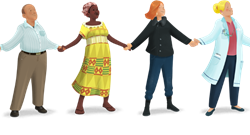May 2019 Sustainable development
Read the articles selected in May 2019
Enabling effective and equitable marine protected areas:
Source: https://wedocs.unep.org
This guide draws from case studies about marine protected areas as example of governance for a sustainable conservation and sharing of marine resources, showing how the participation and the inclusion in the local decisional processes of the most disadvantaged groups makes a better environmental governance.
Read more:
https://wedocs.unep.org/bitstream/handle/20.500.11822/27790/MPA.pdf?sequence=1&isAllowed=y
The future of work? Work of the future
Source: The European Commission
The first thing to shape the AI which we want is to reform the educational models and time and the learning paradigms for all, young and adults. Only this way we can prepare the world of work to the digital transition, and adapt us to the different impact it will have in the long and short term.
Read more:
https://ec.europa.eu/epsc/sites/epsc/files/ai-report_online-version.pdf
Put equity first in climate adaptation
By Marc Pelling & Matthias Garshagen
Source: Nature, 14 May

To fight the poverty, policymakers should look at the bottom numbers of the poverty rates, and put the poor that don’t sum up the average in the centre of the governments’ agendas. In particular, the poorest are also the most vulnerable to climate change.
Read more:
https://www.nature.com/articles/d41586-019-01497-9
Risk reduction of cognitive decline and dementia
Source: WHO
These Guidelines are studied for a public health response to a rapidly growing global public health problem. Despite being related to societies’ ageing, dementia is not a natural consequence of ageing, but is associated with lifestyle risk factors, that are modifiable.
Read more:
https://apps.who.int/iris/bitstream/handle/10665/312180/9789241550543-eng.pdf?ua=1
UN Climate Action Summit 2019
Source: https://www.un.org
The next UN Climate Summit, taking place on 23 September, wants to collect the energy of the movements of countries, companies, cities and civil society towards the objectives of the Paris Agreement, showing that keeping the global temperature below 2°C above preindustrial levels is still possible.
Read more:
https://www.un.org/en/climatechange/un-climate-summit-2019.shtml
Safety and health at the hearth of the future of work
Source: ILO
The recognition of safety and health at work is the fundament of any other right. OSH have an impact on the life of people in general and on the whole society. Promoting a culture of forecasting and the education on OSH helps to develop a human-centred way to stay at work.
Global warming has increasedglobal economic inequality
By Noah S. Diffenbauch & Marshall Burke
Source: asvis.it

This article tries to demonstrate that the anthropogenic climate change has sharpened inequalities between warm and cool countries due to the different effect of the heightened temperatures on the economic growth, in addition to the inequal distribution of the benefits of the fossil fuel use.
Read more:
https://www.pnas.org/content/early/2019/04/16/1816020116
The future of work Oecd Employment Outlook 2019
Source: oecd.org
The transformations in the world of work require stronger social protections before the heightened uncertainties and the new forms of work emerging in a grey zone between dependent and self-employment, not at all defined by the current regulations , designed for the world of yesterday.
Read more:
https://www.oecd-ilibrary.org/sites/9ee00155-en/index.html?itemId=/content/publication/9ee00155-en
The deadly threat to biodiversity
Source: The Washington Post, 7 May
The preservation of the uncontaminated nature has a reason that overcomes the beauty of the landscape or the development of poor areas. We draw from the biodiversity to make drops better, to discover new drugs, to protect the environment from natural disasters and to keep it clean.
Environmental crisis
By Jonathan Watts
Source: The Guardian, 7 May
The British government has commissioned a new study which calculates the economic value of the echosystems that keep us in life, and the costs of neglect, taking into account at the same time the not quantifiable value of the spirituality and the beauty of the nature.
L’Italia chiama Europa. L’ambiente ritrovato
Source: WWF
In the same way it has built from the ruins of the World War the Single Market, Europe has elaborated from the failure of the past economic models a new, valorial concept of well-being through all the Union’s policies, in which is realized and evolving the concept of sustainable development expressed by the UN.
Read more:
World Employment Social Outlook
Source: ILO
In the ILO’s centenary, this report focuses on the goal of decent work for all as a prerequisite of social justice. Yet a majority of the actually employed 3.5 billion people suffers from the lack of the material conditions of a decent living and without chances for a human development.
Read more:
Sustainable Connectivity. Closing the Gender Gap in Infrastructure
Source: http://www.oecd.org
A sustainable infrastructure is essential to many aspects of sustainable development. This paper highlights its role in increasing labour force participation by women, if taking into account the needs of both working women and children, as well as the different impacts infrastructures have on other vulnerable groups.
Read more:
“The green economy is the future”, UN chief says in Beijing.
Source: un.org
In sight of the next Climate Action Summit taking place on 23 September in New York, the UN Secretary-General António Guterres has called governments to enhance their Nationally Determined Contributions by 2020 to meet the Paris Agreement and foster a green development.
Read more:
https://news.un.org/en/story/2019/04/1037461
World Immunization Week 2019
Source: https://www.who.int

The Immunization Week is the occasion for launching an alarm on the pervasive backsliding of dangerous infections, easily preventable with a vaccine. How diverse are the reasons of not getting a vaccination, the results are anyway dramatical, like the increased rate of measles by 300% globally reported by the WHO.
Read more:
Info
- Pubblicato il : 03/06/2019 Modificato il : 03/06/2019

